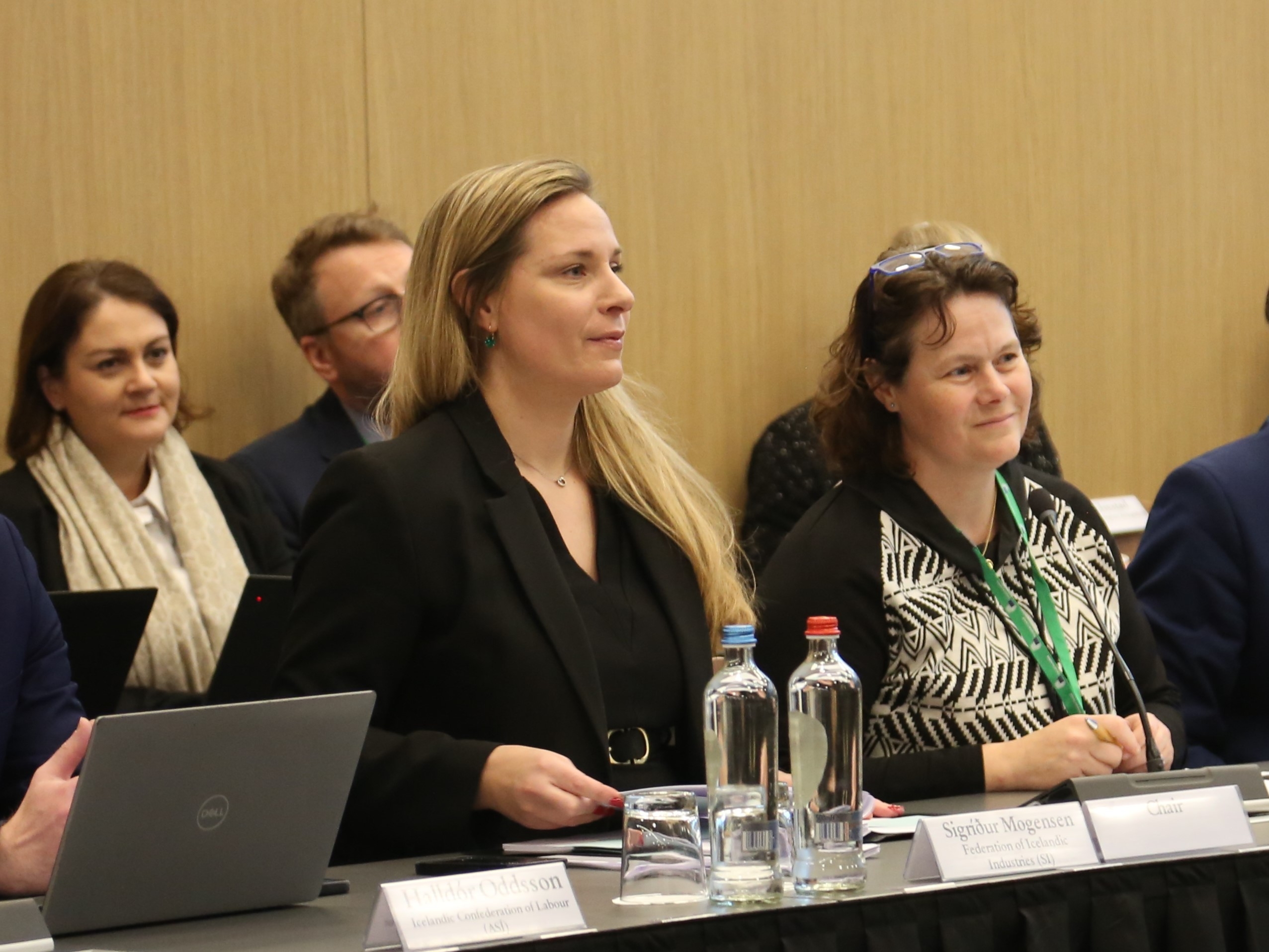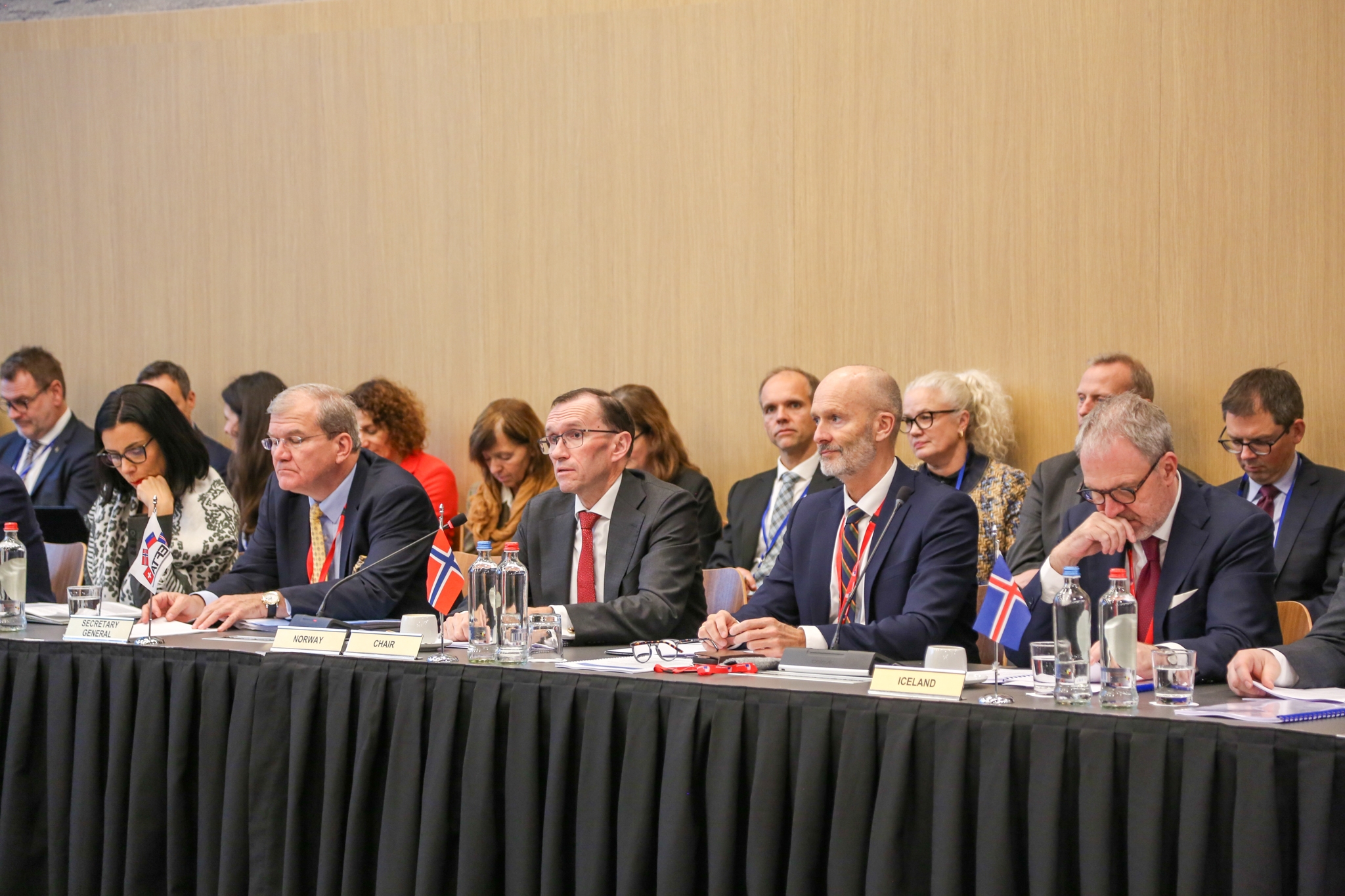
Sigríður Mogensen from the Federation of Icelandic Industries and Karin Zech-Hoop, Member of the Liechtenstein Parliament, chaired the meeting on behalf of the advisory bodies.

Sigríður Mogensen from the Federation of Icelandic Industries and Karin Zech-Hoop, Member of the Liechtenstein Parliament, chaired the meeting on behalf of the advisory bodies.
On 25 November 2024, EFTA parliamentarians and high-level representatives of the EFTA social partners met with the EEA EFTA foreign ministers for their annual meeting on the margins of the EEA Council.
They discussed topics related to ensuring continued European competitiveness, as well as to securing the future of the Internal Market in an increasingly complex geopolitical environment. The meeting provided an excellent opportunity to take stock of issues relevant to the EEA cooperation and to exchange views on the potential influence and contribution of the EEA EFTA States in Europe’s response to new political developments.
The meeting was co-chaired by Ms Sigríður Mogensen, Chair of the EFTA Consultative Committee, and Ms Karin Zech-Hoop from the EFTA Parliamentary Committee. At ministerial level, the meeting was attended by Mr Espen Barth Eide, Norwegian Minister of Foreign Affairs and Ministerial Chair of the EFTA Standing Committee, Ms Dominique Hasler, Liechtenstein Minister of Foreign Affairs, and Mr Kristján Andri Stefánsson, Ambassador and Head of Mission of Iceland to the EU.
Europe’s quest for competitiveness: A joint endeavour
Against the backdrop of the Draghi Report on the future of European competitiveness, participants agreed that the EEA EFTA States needed to follow new EU initiatives closely that focus on strengthening the EU’s economic security, innovation and decarbonisation efforts. “As full participants of the EU’s Internal Market, we make an important contribution to driving European competitiveness”, said Ms Mogensen. “At the same time, we need to stay alert so as not to miss out on upcoming EU measures in the field of competitiveness.”
Considering the rapidly changing geopolitical context and recent global shocks, Foreign Minister Barth Eide underlined the important role of the EEA cooperation in boosting Europe’s competitive edge and resilience. “New EU initiatives that aim to address issues linked to security, innovation, decarbonisation and strategic dependencies will impact and shape the future of the Internal Market. Looking ahead, it is crucial that we continue to engage in constructive dialogue with our EU partners to underline our cooperation and valuable contributions to sectors that are key to strengthening Europe’s competitiveness.”
Exploring opportunities to further deepen the Single Market
Participants also discussed the EU’s ambition to further unleash the potential of the Single Market by eliminating regulatory barriers. “For our countries with limited domestic markets, access to the Single Market and its 450 million consumers has expanded business opportunities tremendously”, said Ms Zech-Hoop. “We now need to examine carefully in which areas there is potential to further deepen or complete the Single Market, and where this is politically viable.”
Foreign Minister Hasler highlighted an improved environment for SMEs as a crucial aspect of empowering the Single Market. “Small and medium-sized enterprises are the backbone of our economies – nearly all companies in the EFTA countries are SMEs. We therefore welcome the EU’s goal to reduce administrative burdens, which can have a particularly negative impact on these companies.”
New EU cross-sectoral initiatives
Finally, participants discussed the EFTA Task Force Report on cross-sectoral EU initiatives and the way ahead for the EEA. They agreed on the importance of timely and holistic assessments of these initiatives, and of taking their potential impact on the EEA into careful consideration. In this context, the parliamentarians and social partners looked forward to continuing the dialogue on how the Task Force’s recommendations would be implemented by the EEA EFTA States.
The EFTA Parliamentary Committee is a forum of parliamentarians from the EFTA States, while the EFTA Consultative Committee brings together representatives of trade union confederations and employers’ associations in the EFTA States. The objective of these committees is to scrutinise issues relevant to their stakeholders and provide advice to the EFTA States, including on the EEA Agreement. They are vital platforms for dialogue and consultation on the political, social and economic aspects of EEA matters.

The advisory bodies meeting with the EEA EFTA Ministers. From left to right: Minister of Foreign Affairs, Education and Sport of Liechtenstein, Dominique Hasler, Secretary-General of the EFTA Secretariat, Kurt Jager, Minister of Foreign Affairs of Norway, Espen Barth Eide, Ambassador and Head of Mission of Norway to the EU, Anders H. Eide, Ambassador and Head of Mission of Iceland to the EU, Kristján Andri Stefánsson.